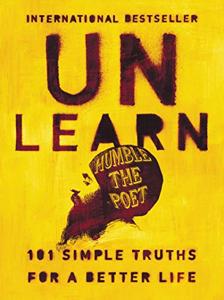
Want to learn the ideas in Unlearn better than ever? Read the world’s #1 book summary of Unlearn by Humble the Poet here.
Read a brief 1-Page Summary or watch video summaries curated by our expert team. Note: this book guide is not affiliated with or endorsed by the publisher or author, and we always encourage you to purchase and read the full book.
Video Summaries of Unlearn
We’ve scoured the Internet for the very best videos on Unlearn, from high-quality videos summaries to interviews or commentary by Humble the Poet.
1-Page Summary of Unlearn
Overview
When you want to achieve a goal, it can be difficult to judge how likely you are of achieving that. This is where a colleague or friend comes in handy – they can assess your ability at meeting the goal and tell you what behaviors will help or hinder achievement. Next, determine one small behavior change that would increase your likelihood of success and try it out immediately.
Have there been times when you were performing well in your job? You knew which strategies to use and how to present them. Your board was impressed, and stakeholders admired you. But then, things started going downhill for some reason. You didn’t know why at first, but now that your confidence is fading, so is everyone else’s on the team.
Sometimes, even though you’ve been successful in the past, your career can stall. This happens when you fail to realize that your old strategies are no longer effective. If you want to regain your position as a great leader, then it’s time for some unlearning.
In this article, you’ll learn about the skills of a professional tennis player and how they can be applied to business. You’ll also learn about reconnecting with your childhood behavior, which will help increase your success rate in business. Finally, you’ll discover how using social media will make you a better leader.
Big Idea #1: When your performance fails, it’s important to change your mind-set. You can do that with a system called the Cycle of Unlearning.
In 2010, Serena Williams was the top-ranked female tennis player in the world. However, she then suffered from injuries and poor health for most of 2011 and her performance wasn’t as good. In 2012, she lost to Virginie Razzano at the French Open even though Razzano was ranked 111th.
Serena Williams was determined not to give up at her first failure. She made radical changes to her training regimen, including appointing a new coach, Patrick Mouratoglou. By the end of 2015 season, she held all four Grand Slam titles and had won back-to-back French Opens for the first time in her career. The key message is that you can change your mind-set when your performance fails by using a system called “The Cycle of Unlearning.” It’s based on Serena Williams’ journey from defeat to triumph as well as business leaders changing their tactics when they’re no longer getting results with what they’ve been doing.
The Cycle of Unlearning isn’t a formal training program. It’s a three-phase process that helps you move beyond outdated ideas and strategies. This doesn’t mean discarding the wisdom gained from past experiences, but rather recognizing what is no longer relevant and seeking out fresh perspectives.
Unlearning requires courage because we must go outside our comfort zone to experiment with new strategies. It’s risky, but it’s essential in today’s world of rapid change. Knowledge doesn’t last as long as it did for centuries; therefore, we need to keep learning when necessary.
If you’re skeptical about the idea of giving up old strategies that have worked for you in the past, think about how companies like Google and Apple have continued to succeed. These companies are led by leaders who encourage experimentation and try new things. If you want to join their ranks, then first consider what’s holding you back from trying something different.
Big Idea #2: If you want to unlearn something, you must first become aware of the obstacles that stand in your way.
Andy Grove, the CEO of Intel, had a crisis on his hands. The demand for memory chips was plummeting and unless he did something drastic, it would be catastrophic to the business. He thought about how an outsider might handle this situation and decided that he needed to make a big change in direction by moving away from memory chips and focusing on microprocessors instead. This new approach helped him overcome this obstacle because he looked at things differently than before.





